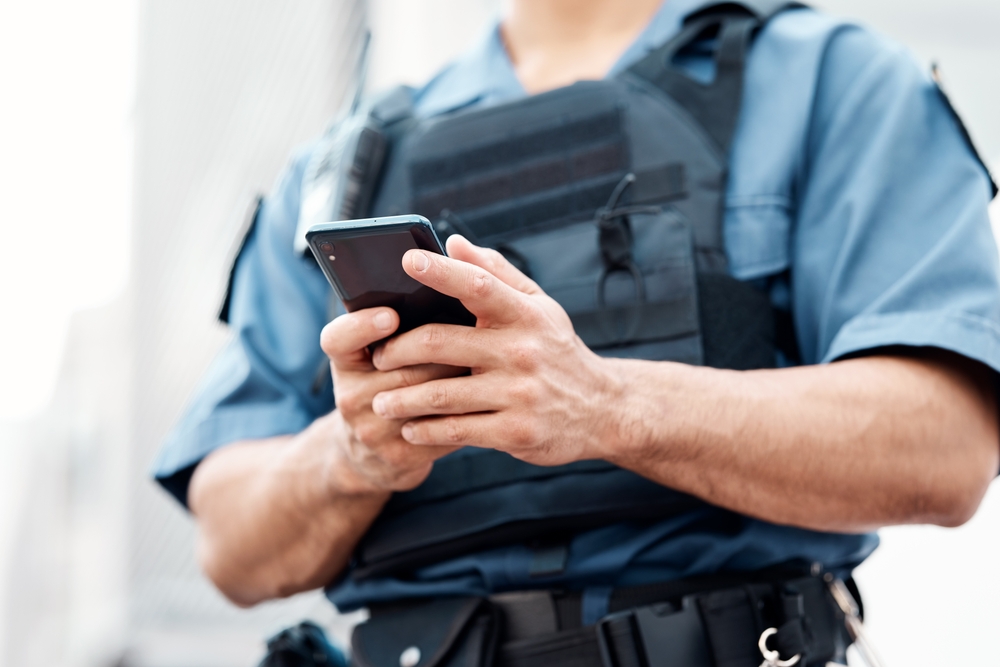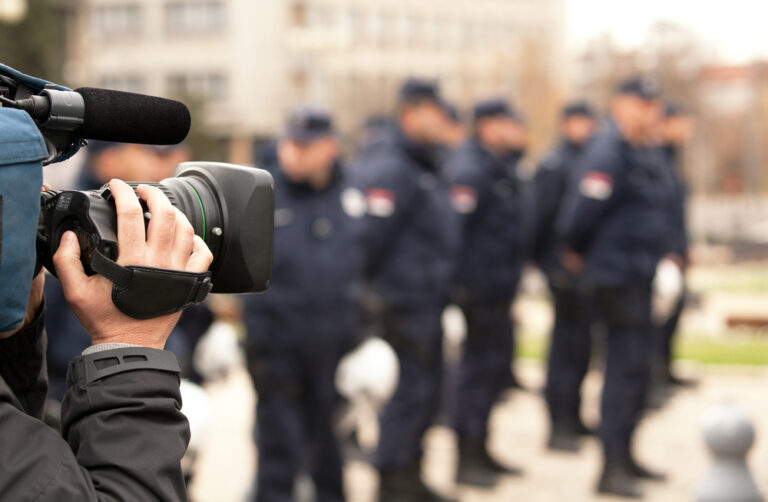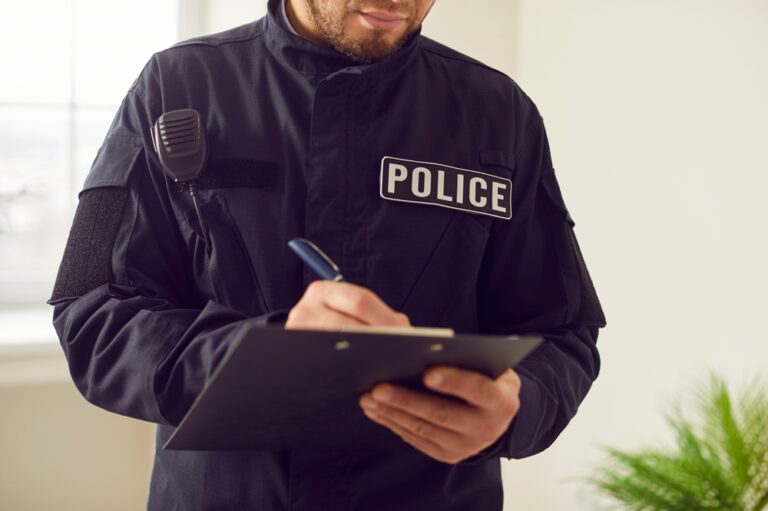
Police Tape 101: Everything You Need to Know
Police tape, commonly known as crime scene tape, is an important tool used by law enforcement to secure…

The purpose of this article is to help law enforcement officers and others better communicate with someone experiencing psychosis. The following information is presented according to a combination of research, studies, and my own experience of over ten years on the police force.
There are two main reasons why this should be a focal point for all patrol officers:
We are not saying that the use of force toward individuals experiencing psychosis is never justified or necessary. Instead, we are offering tools and advice to prevent situations from getting out of control. Furthermore, the guidelines that I offer here are not exhaustive. I encourage others to share their experience, as well as methods that may have worked well for them. My goal is to promote open discourse so that we may all work together to better our procedures and ultimately, our profession.
Many of the mentally ill persons we encounter suffer from some sort of psychosis. Keep in mind that psychosis is not an illness in itself but a symptom. Therefore, we must also note that not all persons who suffer from psychosis are mentally ill, and vice versa.
According to WebMD.com, “Doctors don’t know exactly what causes psychosis, but some known risk factors include:
Psychosis can also be a symptom of a mental illness, like schizophrenia or bipolar disorder.”
Psychosis is usually divided into three symptom clusters. A person with psychosis might experience symptoms from one or more of these clusters.

Hallucinations are false sensory experiences that are perceived as real to the person experiencing them. Examples include seeing, hearing, smelling, tasting, and even feeling things that are not real.
The most common hallucination is an auditory hallucination, such as hearing voices. These voices are often negative and hostile, but not always.

Delusions are usually false beliefs that have no basis in real fact. Examples of this might be:

Experiencing thoughts racing through your head without the ability to stop them. It may cause you to be very easily distracted and you may experience irrational associations when trying to focus on one subject.
We have compiled a list of questions you can ask someone you suspect might be experiencing psychosis. Keep in mind that you have to assess the entire situation before asking as some of these questions may come off as rude or condescending. However, we have found that the benefits of asking these questions often outweigh the possible drawbacks.
If the person is displaying odd behavior:
Keeping your distance is not simply a safety measure. Someone experiencing psychosis might have an adverse reaction if you come too close, especially if you use sudden movements. Keep this in mind when working with people who are paranoid and/or visibly upset.
Remember that a police officer can seem intimidating to a person experiencing psychosis. Keeping your hand on your gun or fiddling with your duty belt may cause anxiety for someone who’s already agitated.
Assess the situation and consider changing your position to appear less dominating. Is it possible to sit down or kneel instead of standing above the person?
Try having a neutral/friendly facial expression.
However, exercise caution. Smiling broadly can appear insulting, suspicious, or even frightening. Consider the other person’s point of view; a broad smile during a (perceived) life crisis may come across as mocking and/or suspicious. Therefore, it is always crucial to assess the situation as much as possible before interacting.
When talking to a regular person, a hand on the shoulder can be a reassuring gesture that helps further communication. However, a victim of psychosis might find it threatening. It could trigger something in them and escalate the situation.
Continued assessment of the situation is imperative. Notice if the person is backing away as you approach them or if they appear to have a wide comfort zone. In some situations, it might be appropriate to ask the person flat-out if they are okay with you approaching and/or touching them.

When interviewing a routine suspect, it is almost always best to start with open-ended questions. This might not be the case, however, when speaking with someone who is having a psychotic episode. For them, an open-ended question might conjure too many options in their mind, making it difficult to answer. Remember, some people may experience racing thoughts and/or have trouble focusing on one subject. Or they might suddenly change the subject to something completely irrelevant.
In this case, it is often better to start with simple yes or no questions. This way you can build rapport with the person without having to interrupt them if they digress into irrelevant matters.
Most importantly, be patient! It may take someone a while to understand and answer simple questions due to a barrage of mental distractions. Therefore, give them ample time to answer and do not rush them if at all possible.
Avoid making promises you can’t keep. If you know you’re taking a person to a psychiatric hospital, do not say that you’re taking them somewhere else. Doing so can lead to an unnecessary escalation when the person realizes they have been deceived. For example, if a person is experiencing paranoia, being lied to by the police might serve as confirmation that the police/government are out to get them.
If you do not know the answer to the questions you’re being asked, be honest about it.
Do not give a suspect the impression that the situation is up to debate or interpretation. And do not let them “trick” you into arguing with them. Instead, be clear, concise, and calm. Repeat yourself if necessary but strive to keep a polite tone.
If a person is agitated and/or repeating themself, it could be a good idea to divert their attention to something else. Try to use a neutral subject that they may have mentioned during your interaction. This can help build a connection and keep the person from spiraling further out of control.
Try to pacify a chaotic situation by helping ease practical concerns. For instance, many people have pets and you can consider helping them get someone to look after their pet(s) if they are to be arrested or admitted to a psychiatric hospital.
Do not underestimate the value of cigarettes. I always carry a pack on me and offer a cigarette to smokers that don’t have any. If you are taking a smoker to the clinic, you might ask if they have cigarettes to take with them.
Asking if they’re on any medication and making sure to bring it along is also helpful. They will probably get whatever they need at the hospital but bringing their meds will nonetheless ease their anxiety.
Validate that the person is having a hard time. Reassure them that you understand what they are going through and that you empathize with them.
Psychosis often originates from past trauma. People sometimes reveal these traumas and if they do, seize the opportunity to validate them by saying things like “I understand that must have been very hard for you,” etc.
This is particularly important when dealing with veterans. In many cases, they are ashamed to admit that their mental problems stem from past deployments. This is especially true if they think that the police officer has a background with the armed forces.
Try to delay the use of physical force as long as possible. There is a clear link between physical and/or sexual abuse in the formative years and psychosis later in life. Using physical force may trigger flashbacks from said experiences (re-traumatizing), escalating the situation further. Also, many psychiatric patients encounter the police numerous times in their lives. If they have experienced unnecessary use of force in the past, they will likely not comply easily.
Furthermore, we must remember that being mentally ill and/or experiencing psychosis is not a crime and we shouldn’t treat psychiatric patients as criminals. They deserve the same dignity and respect as anyone else. That being said, you may come across a mentally ill person who wants to interact with the police. In fact, some have flat-out admitted that they enjoy the attention and interaction. We needn’t speculate on their motives but always keep in mind that, until there is reasonable evidence to suggest that they have committed a crime, they shouldn’t be treated otherwise.
It is important for law enforcement officers to be familiar with the community resources and support systems available to mentally ill individuals and/or victims of psychosis, as these can provide valuable care and support.
Having access to these resources can also help ease the burden on police officers as they can refer people to the appropriate services rather than trying to handle it all on their own. This will ensure that the needs of mentally ill individuals are being met in a comprehensive and coordinated manner.
Additionally, having informational materials available to law enforcement officers in the field will prove to be very helpful. For example, if an officer encounters a mentally ill individual who needs support or assistance, they can provide them with a pamphlet or refer them to the appropriate local resources.
Working with psychosis victims can be emotionally draining and it is important for law enforcement officers to practice self-care to avoid burnout. This may involve setting boundaries, seeking support from colleagues or a supervisor, and finding ways to manage stress and maintain overall well-being.
When it comes to interacting with people who are experiencing psychosis, it is important for law enforcement officers to understand that these individuals may be struggling with realities that differ from those around them. This can make communication challenging, as the person may not understand or respond to questions or statements in the same way that a normal person would.
However, it is important to recognize that people experiencing psychosis are not necessarily violent or dangerous and that the vast majority of interactions with these individuals can be resolved peacefully. Research has shown that law enforcement officers who are trained in de-escalation techniques and mental health crisis intervention are better equipped to handle situations involving psychosis victims safely and effectively.
By utilizing the principles in this article, law enforcement officers can improve communication with psychosis victims and de-escalate potentially volatile situations. This, in turn, will help improve the safety and well-being of both the officers and the people they serve, as well as reduce the potential for unnecessary force.

Police tape, commonly known as crime scene tape, is an important tool used by law enforcement to secure…

The police are called daily regarding various incidents of public interest. It is our responsibility to provide the…

Many police officers experience terrible, traumatic events in the line of duty. A significant number of police officers…